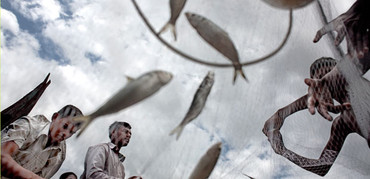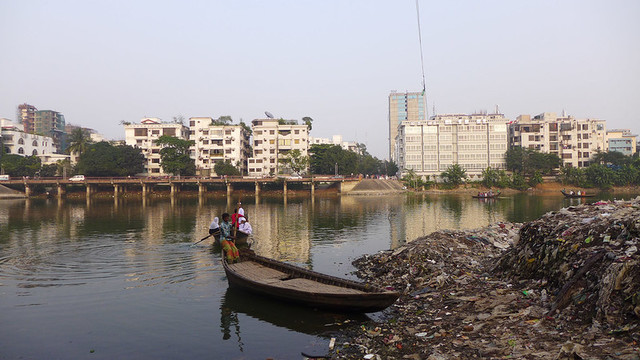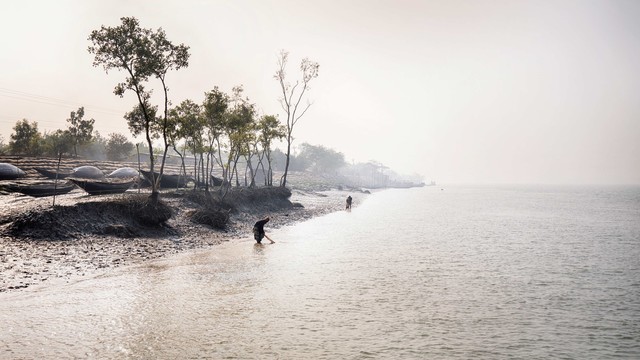UK's Darwin Initiative funded project strives to reduce threats to hilsa fish
Senior Bangladeshi officials, researchers and IIED staff have met to review a project that aims to restore hilsa fish stocks and create a sustainable fishing industry in the country. The UK-funded project uses economic incentives to improve fisheries management and secure the livelihoods of fishing communities.

Government officials and researchers discuss the future of hilsa management on 19 January (Photo: Essam Mohammed/IIED)
Today, officials from the Department of Fisheries of the Ministry of Fisheries and Livestock welcomed a meeting with researchers to discuss the future of hilsa management. Called 'Ilish' in Bengali, the hilsa is of national importance to Bangladesh as one of the country's main staple foods.
The researchers, from the International Institute for Environment and Development (IIED), the Bangladesh Centre for Advanced Studies (BCAS) and the Bangladesh Agricultural University (BAU) have been working in partnership with the Department of Fisheries on a research project (see note 1), funded by the UK's Darwin Initiative, which aims to reduce threats to hilsa fish and biodiversity in the Lower Meghna region.
Once abundant in the Bay of Bengal and hundreds of rivers in Bangladesh, India and Myanmar that feed it, the Hilsa fish declined steeply in numbers since the 1970s, largely because of overfishing.
In 2004, after pressure on the fish species – which is popular throughout South Asia – had grown, the Government of Bangladesh declared four coastal areas as hilsa sanctuaries, in which fishing is illegal during the fish's breeding season.
The Department of Fisheries has made commendable efforts to ensure sustainable management of hilsa fishery in Bangladesh, compensating the nearly 200,000 affected households with 30 kilogrammes of rice each and for the last ten years.
Dr Essam Yassin Mohammed, a senior researcher with IIED, explained: "Unlike in many other countries that resort to command-and-control measures to manage their fisheries resources, the Government of Bangladesh has introduced a rare example of compensation scheme to alleviate the short-term cost of fishing restrictions borne by poor fisher communities. What makes it even rarer is that the government developed and funds the scheme without any external assistance."
However, as the hilsa (Tenualosa ilisha) fishery employs nearly half a million full-time and 2.5 million part-time workers, making up around a quarter of the Bangladesh fisheries sector it is vital that this industry has a sustainable future which supports the people involved and allows fish stocks to recover.
The research team, in partnership with the Department of Fisheries, have identified some critical knowledge gaps that need to be filled through rigorous research (see note 2).
At the request of the director general of the Department of Fisheries Dr Md. Arif Azad, the team organised a briefing meeting with senior officials from the department, to share knowledge generated through the research since its inception.
Mohammed added: "So far, the main lessons we have learned while carrying out our research is that there is a need to align the preference of the fishers with the actual compensation that is provided. The cost-effectiveness of the scheme could also be improved by simplifying the lengthy, complex and costly targeting and distribution processes.
"Further efforts should be made to effectively target the most vulnerable fishers, and if fish stocks are to continue recovering, we should take notice of the results of our assessment of the reproductive cycle and habitat of hilsa. We hope the research findings will inform the design of the compensation scheme so that it delivers near maximum social and ecological benefits."
At the briefing session, Dr Azad said: "Hilsa is the national fish of Bangladesh. It is part of our identity. The government is investing its own resources to manage hilsa fishery sustainably. We are pleased that IIED, BCAS and BAU are working together through the financial support of the UK's Darwin Initiative to enhance the effectiveness of our economic incentive mechanism.
"We are the pioneers in the use of a direct economic incentive-based fisheries management and we would like to inspire other countries across the globe to introduce the same mechanism."
Mr Zahid Habib, director of the government-sponsored compensation scheme, who was also at the briefing meeting, emphasised that: "The economic incentive-based hilsa fishery management is a unique approach we introduced to induce behavioural change of fishers to ensure the livelihoods of fishers are improved and hilsa fishery is sustainably managed.
"Our initiative is very dynamic. We will therefore continue to work closely with the IIED, BCAS and BAU team to take on board their recommendations and further improve our programme."
When asked about his hopes for the future of this project, Mr Liaquat Ali, senior fellow with BCAS, said: "The ideal outcome is that our work with IIED, BAU and the Department of Fisheries will lead to a resilient and healthy hilsa fishery. This should include a recovered fish stock, a sustainable compensation scheme and improved livelihoods for the fishers."




